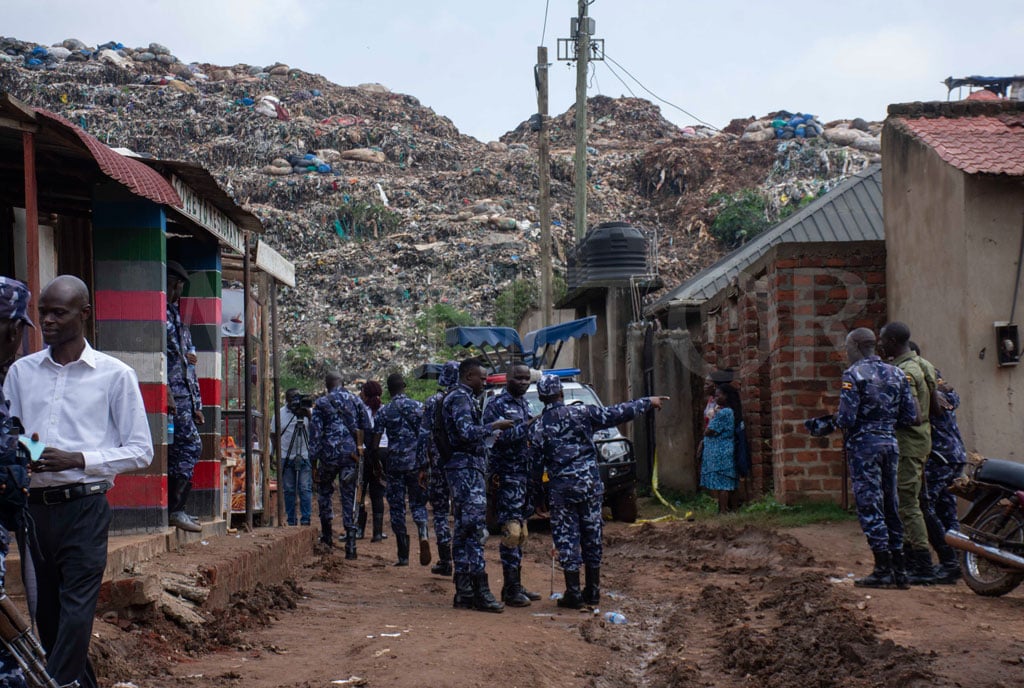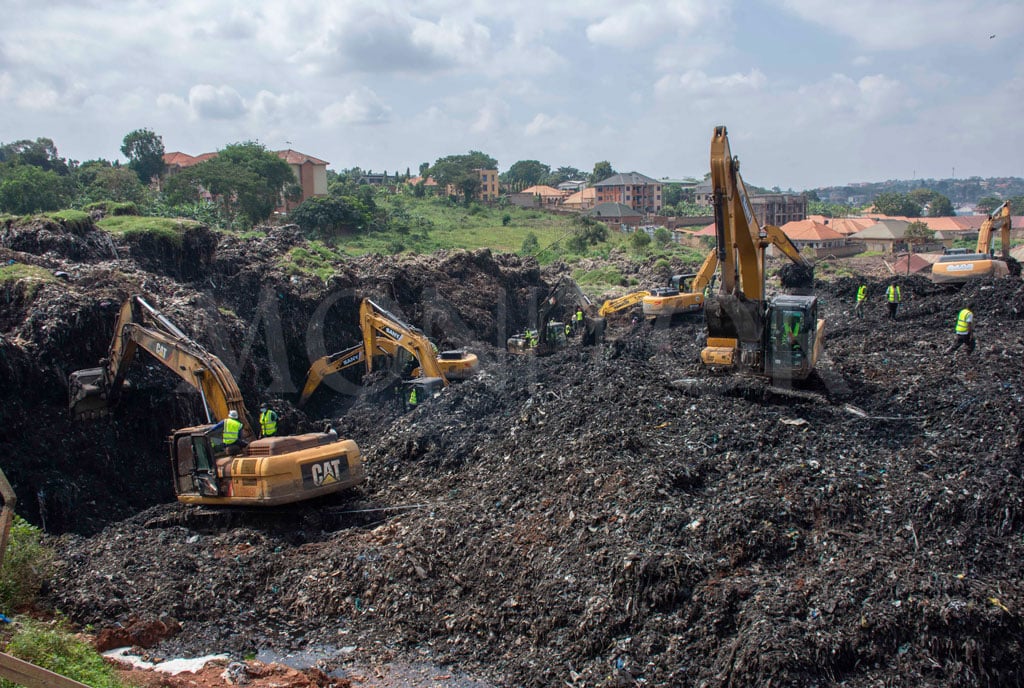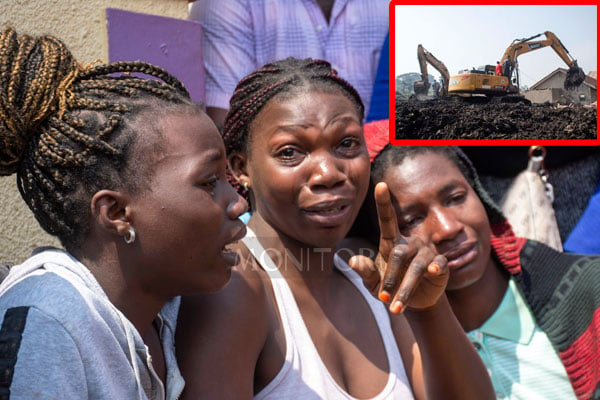
A resident shows Prime Minister Robinah Nabbanja photos of his missing relatives at Kiteezi in Wakiso District. PHOTO /STEPHEN OTAGE
The pungent smell of death casts a pall over the Kiteezi landfill and its vicinity as rescue efforts attempt to find the bodies of those trapped in the mangled rubble where, by Thursday, the death toll stood at 34 and counting.
Hours before tragedy struck, last Saturday, scores of family breadwinners had retired to their tin-roofed homes within touching distance of a dumpsite that a waste management policy recommended to be closed in 2011.
Towards the crack of dawn, death came unannounced like a thief who stalks his victims under the cover of the pitch-black sky. Victims—deep in slumber, including women and children—were pummelled. While the lucky escapes have told heartrending stories all week, it is feared that the remains of scores of people remain buried in the dumpsite.
In a country where the victims of such tragedies are hastily relegated to the footnotes of ignominy and their relatives handed paltry handouts by the government, there is a growing culture of impunity where leaders abdicate their duties and lack the moral conscience to accept responsibility. Speaking to this newspaper early this week, Ms Dorothy Kisaka, the executive director of Kampala Capital City Authority (KCCA), said: “Our records show that as late as 2012 there was a plan to have a public-private partnership around decommissioning Kiteezi.”
Ms Kisaka said: “It was not successfully completed because they needed government guarantees, which could not be given at that time.”
Leaders across the political spectrum this past workweek called for an inquest into the Kiteezi landfill debacle, with Mr Erias Lukwago, the Kampala Lord Mayor, saying in no uncertain terms that “it is clear negligence, recklessness, and insolence on the part of the sitting government.”
Who dropped the ball?
Observers say Lord Mayor Lukwago’s negligence claims might not be wide off the mark. They point to an ominous warning from Daniel Ayen Okello, the Director of public health and environment at KCCA, which largely went unnoticed.

People displaced following the Kiteezi dumpsite collapse are seen in tents at a school in Wakiso District on August 13, 2024. PHOTO/ISAAC KASAMANI
“Recent observations have revealed critical cracks and significant waste movement. These issues are compromising the landfill’s stability and could potentially lead to severe environmental and health risks…,” Mr Okello wrote in a letter to the KCCA top brass, adding, “Without prompt action, the landfill’s instability could escalate, posing significant risks to both human safety and the environment.”
Mr David Luyimbazi, the deputy director of KCCA, told this newspaper on Wednesday that the Authority’s hands were tied. He pointed to the budget for waste disposal that was significantly reduced from Shs6 billion to Shs4 billion.
“For the last four financial years, we’ve been arguing for additional funding for Kiteezi landfill. It has always been an underfunded priority,” he said, adding, “With a limited resource envelope, we can only do so much. The challenge is the resources we have, we have to plan within the limited resources we have.”
In the aftermath of the tragedy, President Museveni asked the Inspectorate of Government (IGG) to investigate the matter. Will the culprits, especially the leaders responsible, be accountable for their acts or their omissions to take action? Did they owe a duty of care to the citizens who perished and do the facts disclose a prima facie case regarding the offence of criminal negligence?

Security officers are seen at the Kiteezi dumpsite in Wakiso District on August 13, 2024, in the aftermath of a trash collapse that left more than 25 people dead. PHOTO/ISAAC KASAMANI
Negligence explained
Section 227 of the Penal Code Act, provides for the offence of criminal negligence. It reads thus: “Any person who, by any rash or negligent act not amounting to manslaughter, causes the death of another person is liable to imprisonment for a term not exceeding seven years or to a fine not exceeding Shs70,000 or to both such imprisonment and fine.”
Section 228 further lists specific rash and negligent acts and reads thus: “Any person who, in a manner so rash or negligent as to endanger human life or to be likely to cause harm to any other person—drives any vehicle or rides on any public way; navigates, or takes part in the navigation or working of any vessel; does any act with fire or any combustible matter or omits to take precautions against any probable danger from any fire or any combustible matter in his or her possession; omits to take precautions against any probable danger from any animal in his or her possession; gives medical or surgical treatment to any person whom he or she has undertaken to treat; dispenses, supplies, sells, administers or gives away any medicine or poisonous or dangerous matter; does any act with respect to, or omits to take proper precautions against, any probable danger, from any machinery of which he or she is solely or partly in charge; or (h) does any act with respect to, or omits to take proper precautions against any probable danger from, any explosive in his or her possession, commits a misdemeanour.
In the 2018 case of Uganda versus Nakiryowa Zamu, High Court Judge Stephen Mubiru articulated in his judgment the parameters of the offence of criminal negligence. “Negligence is a breach of duty imposed by law. It is the omission to do something which a reasonable person, guided by those considerations which ordinarily regulate the conduct of human affairs would do, or doing something which a prudent and reasonable person would not do,” Judge Mubiru said.

Excavators dig through garbage at Kiteezi Landfill on August 14, 2024. PHOTO/ ISAAC KASAMANI
Criminal negligence
Judge Mubiru averred that negligence may either be civil or criminal negligence and the “distinction depends upon the nature and gravity of the negligence. To amount to criminal negligence, it must be gross.”
The landfill tragedy in Kiteezi is likely to fall within the ambit of what amounts to a gross act.
Justice Mubiru also ruled thus: “There must be a direct nexus between the death of a person and the rash or negligent act of the accused. The rash or negligent act should be the direct or proximate cause of the death.”
The judge’s decision is in line with a leading English tort law 1990 case—Caparo Industries plc v Dickman, which discusses the test for a duty of care. The House of Lords, following the Court of Appeal, set out a “three-fold test” for a duty of care to arise in negligence. It established that harm must be reasonably foreseeable as a result of the defendant’s conduct (as established in Donoghue versus Stevenson) an old English tort case of 1932 where Lord Atkin established the “neighbour principle”—the parties must be in a relationship of proximity— and it must be fair, just and reasonable to impose liability.
Lord Atikin postulated thus: “You must take reasonable care to avoid acts or omissions which you can reasonably foresee would be likely to injure your neighbour. Who, then, in law, is my neighbour? The answer seems to be persons who are so closely and directly affected by my act that I ought reasonably to have them.” The accused may rely on the partial defence of contributory negligence if it is proven that some of those who died were encroachers on the land. Contributory negligence is the failure by a person (typically the plaintiff) to take reasonable care for his or her own safety, which contributes to the harm the person suffers.
Business as usual
In the aftermath of the Kiteezi landfill debacle, residents relied on shovels and bare hands to dig as the rescue effort coordinated by the Office of the Prime Minister struggled to gather the necessary pace. This, undoubtedly, led to a higher death toll.
Past precedents are, however, hardly reassuring insofar as holding people culpable is concerned. From the doomsday cult in the remote south-western district of Kanungu, where nearly 1,000 persons were incinerated in a fire in 2001 to the mudslides in Nametsi, Bududa District that buried about 300 in 2010 as well as the June 17, 2023 incident when rebels of the Allied Democratic Forces (ADF) raided Lhubiriha Secondary School, in Mpondwe on the border with the DRC, Kasese District in western Uganda—these tragedies have always been foretold and the evidence warning of the dire consequences laid before officer bearers. The officer bearers have, however, received no more than a slap on the wrist.
Ironically, the UPDF has consistently held its officers who abdicate their duty to a high standard. In November 2023, the UPDF military court martial sitting in Mogadishu, found two of its officers guilty of cowardice.

Members of the Safe and Dignified burial team from the Uganda Red Cross Society carry one of six bodies that were recovered from Kiteezi landfill garbage on August 14, 2024. PHOTO/MICHAEL KAKUMIRIZI
Majors Zadock Abor and John Oluka who were dismissed from the army, ran away on May 26, after al-Shabaab raided a UPDF base at Buulo Mareer, a flat marshland located 110km south of the capital, Mogadishu which previously served as the insurgents’ base.
At the crack of dawn, a force of about 800 fighters—four times the size of the Ugandan army in the camp—launched a multi-pronged attack. Using suicide bombers, eight vehicle borne improvised explosive devices (VBIEDs), grenade launchers, and shoulder-held rocket propelled grenades, the insurgents killed 50 Ugandan soldiers in one of the deadliest incidents.
The court-martial heard that the officers had been warned of an impending attack, but failed to act to deter it. Four non-commissioned officers were also found guilty of failing to protect military equipment.
The next tragedy
It is not unusual for leaders to snake through Kampala’s gridlocked, deep-rutted roads in the comfort of chauffeur-driven Toyota Land Cruiser vehicles to rush to the scenes of tragedy and offer a sorry epitaph. They usually claim that their offices were cash-strapped and this would be the last time such tragedies would occur. Gradually, those who have died are pushed to the back-burners of the country’s collective memory and forgotten until the next tragedy strikes.
Across Kampala and the rest of the country, many glaring accidents are waiting to happen. The fuel depot in Banda, an overpopulated suburb in Nakawa, Kampala District, stands out.




